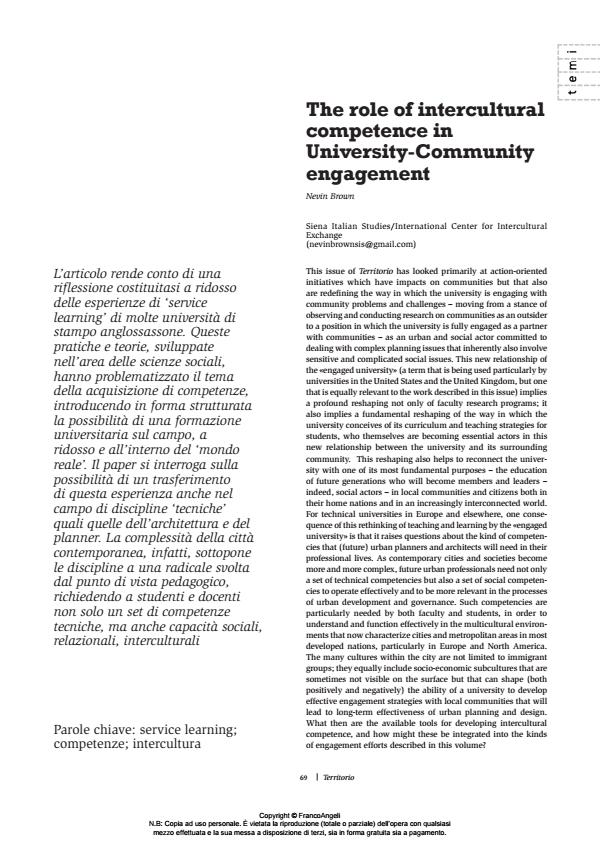The role of intercultural competence in University-Community Engagement
Journal title TERRITORIO
Author/s Nevin Brown
Publishing Year 2013 Issue 2013/66 Language Italian
Pages 4 P. 69-72 File size 226 KB
DOI 10.3280/TR2013-066015
DOI is like a bar code for intellectual property: to have more infomation
click here
Below, you can see the article first page
If you want to buy this article in PDF format, you can do it, following the instructions to buy download credits

FrancoAngeli is member of Publishers International Linking Association, Inc (PILA), a not-for-profit association which run the CrossRef service enabling links to and from online scholarly content.
This paper takes account of thinking arising from the ‘service learning’ experiences of many universities in the UK and North America. These practices and theories, developed in the social sciences area, address the subject of acquiring expertise, introducing the possibility of in-the-field university education in a structured form, up against and inside the ‘real world’. The paper looks at the possibility of transferring this experience to the field of ‘technical’ disciplines such as architecture and urban planning. In fact the complexity of contemporary towns and cities is subjecting these disciplines to a radical change from a teaching viewpoint where not only is a set of technical skills required of students and teachers, but also social, relationship and intercultural abilities.
Keywords: Service learning; skills; intercultural
- Bella Owona J.M., Biagi F., Bracci L. and Ruiz-Coll J.C., 2012, «Reflective Intercultural Competence (Ric) and its Assessment: The Rica Model», in Nash E.J., Brown C. and Bracci L. (eds.), Intercultural Horizons: Best Practices in Intercultural Competence Development, Cambridge Scholars Publishing, Newcastle upon Tyne, pp. 61-82.
- Braskamp D.C. and Braskamp L.A., 2013, The Global Perspective of Entering College Students and Their Precollege Experiences, Association for Institutional Research (Air), Annual Forum (forthcoming).
- Bringle R.G., Hatcher J.A. and Jones S.G., 2011, eds., International Service Learning: Conceptual Frameworks and Research, Stylus Publishing, Sterling, Virginia.
- Chisholm L.A., 2000, Charting a Hero’s Journey, The International Partnership for Service-Learning, New York.
- Chisholm L.A., 2007, Declaration of Principles, The International Partnership for Service-Learning and Leadership, New York (or. ed. 2004).
- Furco A., 1996, «Service-learning: A Balanced Approach to Experiential Education», in Expanding Boundaries: Service and Learning, Corporation for National Service, Washington, DC, pp. 2-6.
- Oberg K., 1960, «Culture Shock: Adjustment to New Cultural Environments », Practical Anthropology, vol. 7.
- Plater W.M., Jones S.G., Bringle R.G. and Clayton P.H., 2009, «Educating Globally Competent Citizens through International Service Learning », in Lewin R. (ed.), The Handbook of Practice and Research in Study Abroad: Higher Education and the Quest for Global Citizenship, Routledge, New York, pp. 485-505.
- Spitzberg B.H. and Chagnon G., 2009, «Conceptualizing Intercultural Communication Competence», in Deardorff D.K. (ed.), The Sage Handbook of Intercultural Competence, Sage, Thousand Oaks, CA, pp. 2-52.
- Tonkin H., 2004, ed., Service-learning Across Cultures: Promise and Achievement. A Report to the Ford Foundation, The International Partnership for Service-Learning and Leadership, New York. United Board for Christian Higher Education in Asia and International
- Christian University, 2002, Service-Learning in Asia: Creating Networks and Curricula in Higher Education, International Christian University, Tokyo.
Nevin Brown, The role of intercultural competence in University-Community engagement in "TERRITORIO" 66/2013, pp 69-72, DOI: 10.3280/TR2013-066015